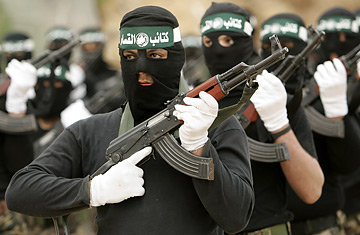
Palestinian Hamas militants take part in an armed exercise in Gaza March 31, 2007.
Is Hamas gathering arms for self-defense against Israel, as its representatives claim? Or is the militant Palestinian organization planning a major assault against Israel, possibly with the help of America's nemesis Iran?
Israeli Prime Minister Ehud Olmert believes he knows the answer. In an interview with TIME, Olmert described Palestinian Prime Minister Ismael Haniyeh as "a terrorist" and accused him of personally masterminding the transfer of $1 million in funds from overseas for "terrorist actions against Israeli citizens." Olmert's remarks were seen by many Palestinians as an attempt by Israelis to discredit the Palestinian unity government.
But Olmert's wariness over Hamas is shared by U.S. and Palestinian officials. They told TIME that Hamas — despite its public commitment to a new coalition government with Palestinian President Mahmoud Abbas — has used a five-month cease-fire with Israeli forces to stage an unprecedented arms build-up in the Gaza strip. "They're armed to the teeth," said one senior U.S. official. "This is not like your average little militia." Indeed, one Israeli official said that, in recent months, Hamas has sent "dozens" of militants to Iran for advanced training in weapons that can destroy aircraft and tanks. Hamas insists that Iranian aid comes solely in the form of financing for the cash-strapped Palestinian government bureaucracy.
Hamas' growing arsenal was the subject of discussions U.S. Secretary of State Condoleezza Rice held at in late March in Aswan, Egypt, with intelligence chiefs from Jordan, Saudi Arabia and Egypt, according to U.S. diplomats familiar with her agenda. Israel is considered to be the Hamas' main target, but if the Palestinian unity government breaks apart, as many expect, Hamas may also be steeling itself for an armed showdown with Fatah militants loyal to Abbas. "The flow of funds and arms [to Hamas] is not conducive to peace and stability," said a source close to the peace process. "You don't want to have arms caches built up for the day when things go bad and then you have civil war on your hands."
Sources also tell TIME that in the Aswan meetings with security chiefs, "the message was sent to Egypt that they need to do a much better job than they are doing at the moment" at curbing the smuggling from Egypt. In the past few months, Egyptians have arrested arms smugglers going into Gaza and suspected suicide bombers coming out.
Israelis say Hamas is amassing weapons in Gaza, a 40-km-long sandy strip bordering Egypt with 1.4 million Palestinians, many of them refugees. One Israeli official said that Hamas, using tunnels into Egypt, had smuggled in over 31 tons of high-quality explosives, six times more than in 2005. Israelis say that Hamas now has rockets capable of accurately striking Ashkelon, a major seaport 15 km north of Gaza.
At Rice's meeting with Arab intelligence chiefs, the Iran-Hamas links emerged as "Topic A," U.S. diplomats said. The Iranians are also a major bankroller of the Palestinian militants, and U.S. State and Treasury officials are urging Gulf officials and bankers to stanch the flows of funds from Iran to Hamas and Hizballah, the Lebanese Shi'a militia. The main conduits from Tehran to the two militia groups are thought to be Iranian bank branches in the Gulf and Islamic charity organizations, according to a U.S. official.
Hamas readily admits that it receives aid from Iran but insists that the money is used for running the Palestinian government, crippled by international sanctions imposed in March 2006 after Hamas' election victory. Says Hamas spokesman Ghazi Hamad: "Money we've received has been transferred to the finance ministry, and we challenge Olmert to come out with one single proof that we've used this money for terrorism."
Hamas' leaders also hinted that if the international community fails to lift its embargo on the Palestinians, the militants might withdraw from the unity government and resume attacks against Israel. During a Friday mosque sermon in Gaza, Haniyeh set a three-month deadline for the international community to recognize the new Palestinian government. Otherwise, he warned, "We Palestinians will take a decision to protect our dignity and our interests."
Usually, the U.S. and Israel are synchronized in their dealings with the Palestinians. But tensions between the two allies emerged during Rice's visit last week. The U.S. is trying to build up Abbas's presidential guard, which is also deployed to halt smuggling along Gaza's Egyptian border and at the Karni crossing into Israel. The State Department is trying to persuade a U.S. Congressional delegation, now in Israel, to support the State Department's request for $59.4 million in non-lethal military aid for Abbas. In practice, Israel is opposing the funding because it thinks that some day Abbas's presidential guard might train its guns on Israel.
One western official familiar with the U.S.-Israeli negotiations says that at the same time the Israelis are accusing the Palestinians of failing to halt arms smuggling, they are working behind the scenes to stop the U.S. aid package to upgrade Abbas's forces. Referring to the Israelis, this official said, "If they're having all these very real, legitimate smuggling problems, then why block an aid package to help the presidential guard?" He added, "You can't expect untrained, unskilled and unqualified people to go into action. Not all of them even have boots."
With reporting by Jamil Hamad/Bethlehem, Aaron J. Klein/Jerusalem and Scott MacLeod/Cairo
